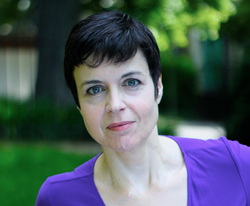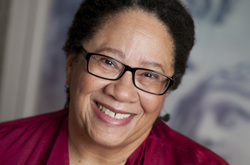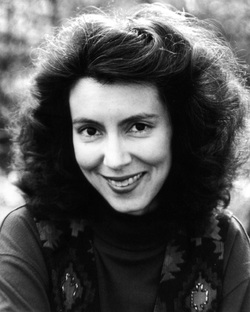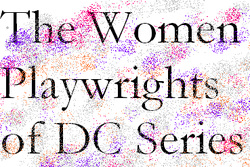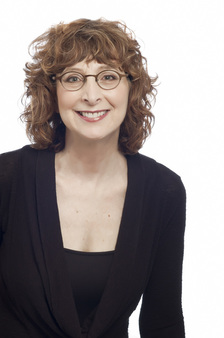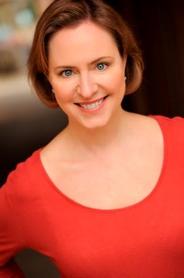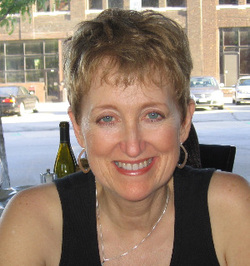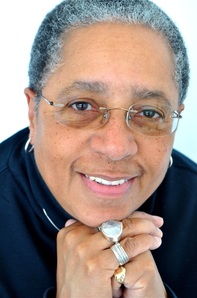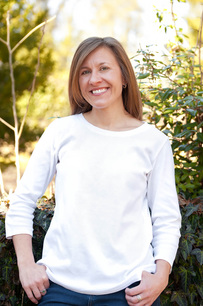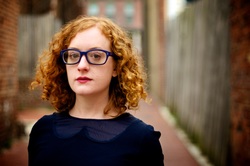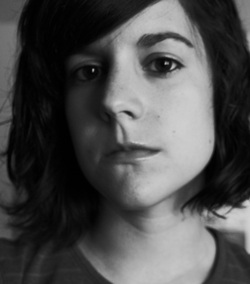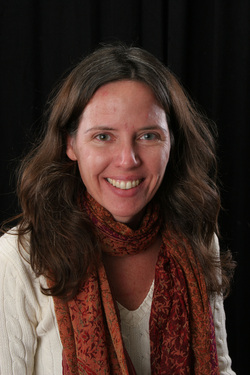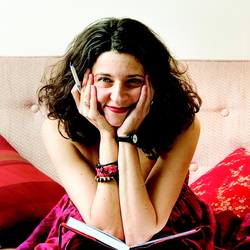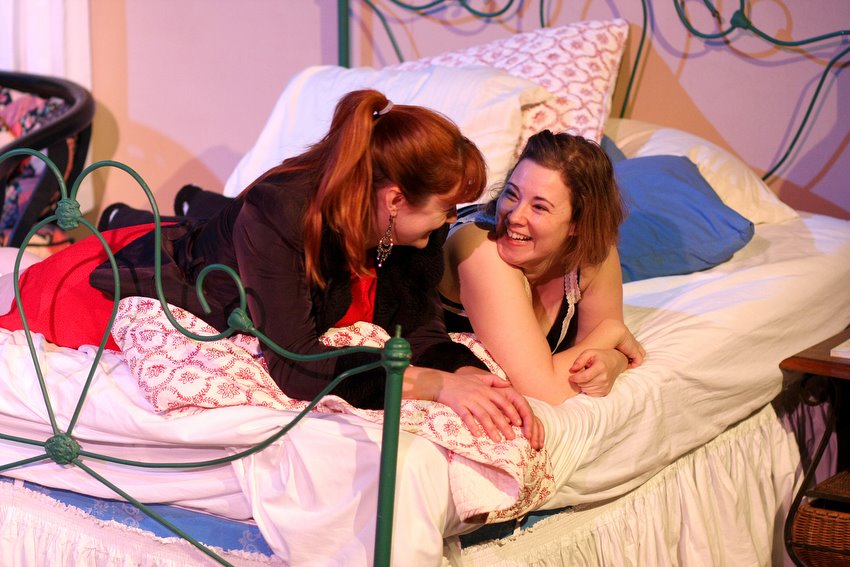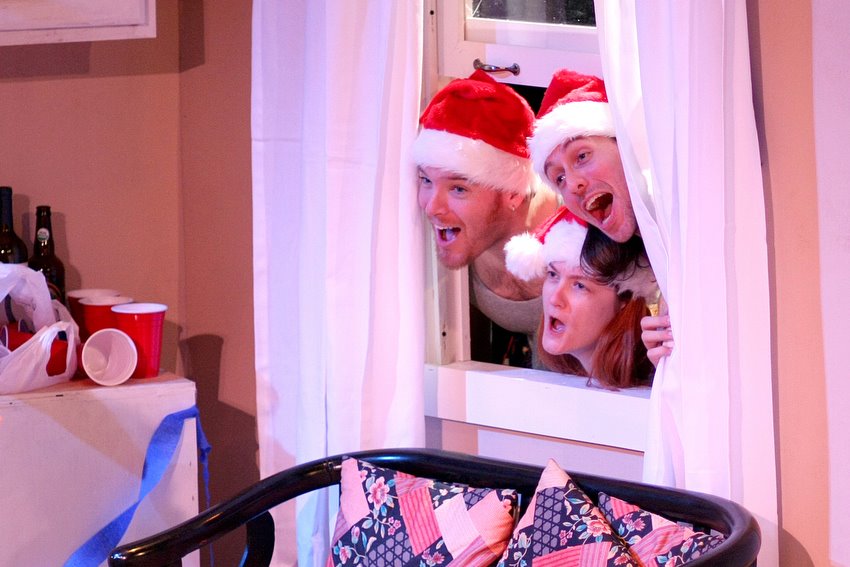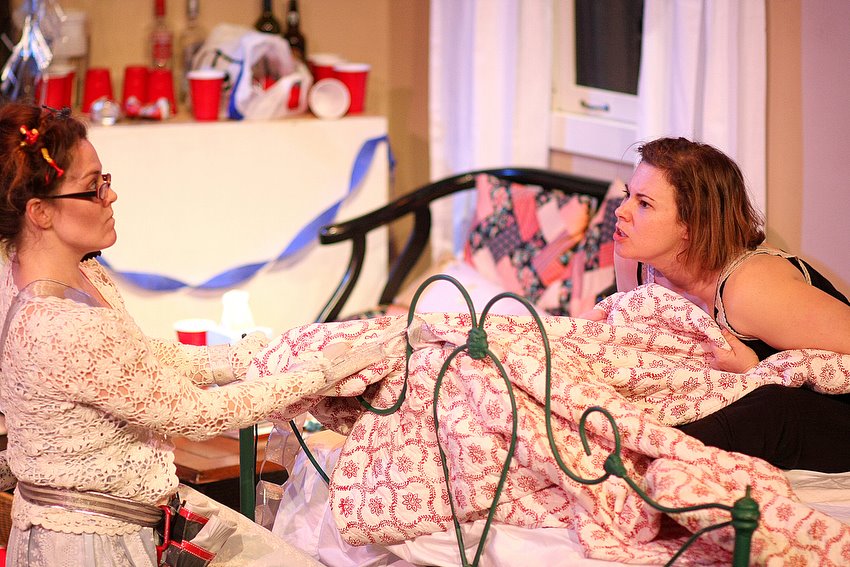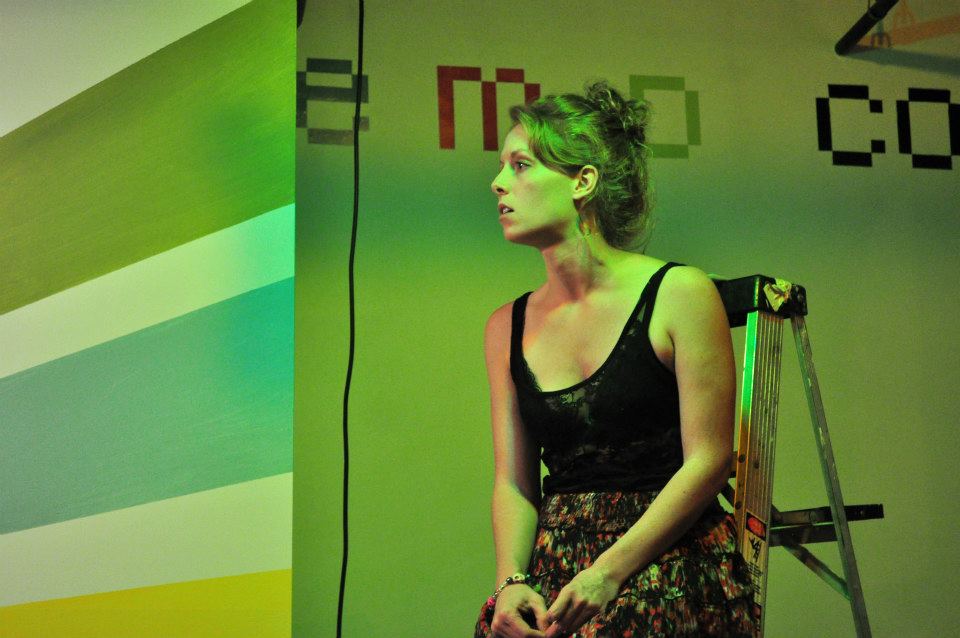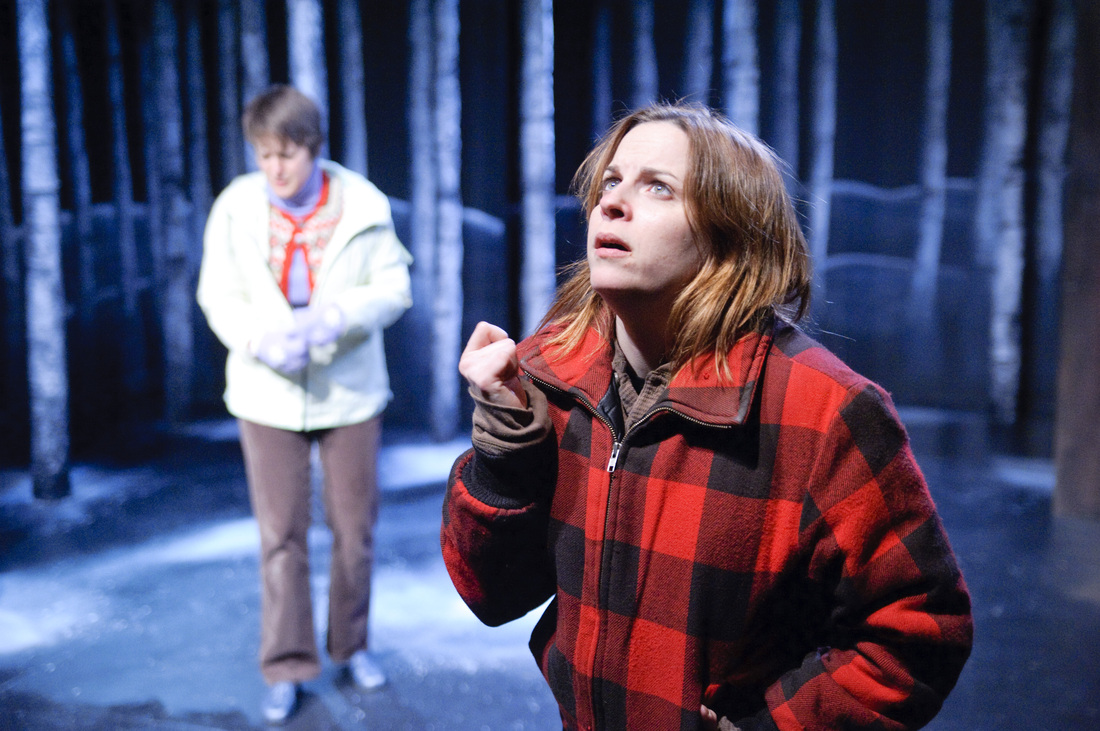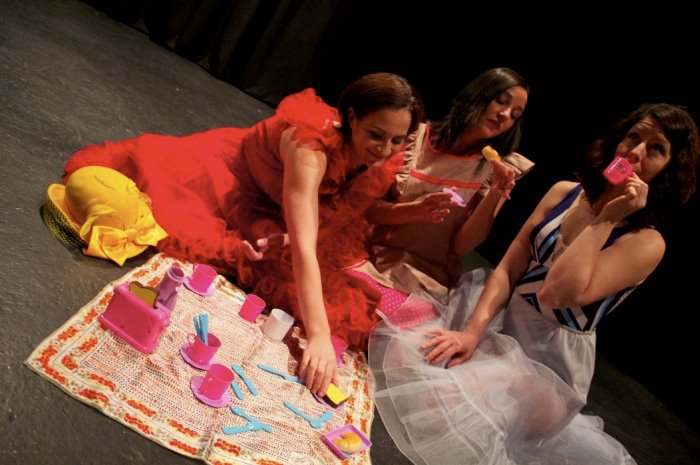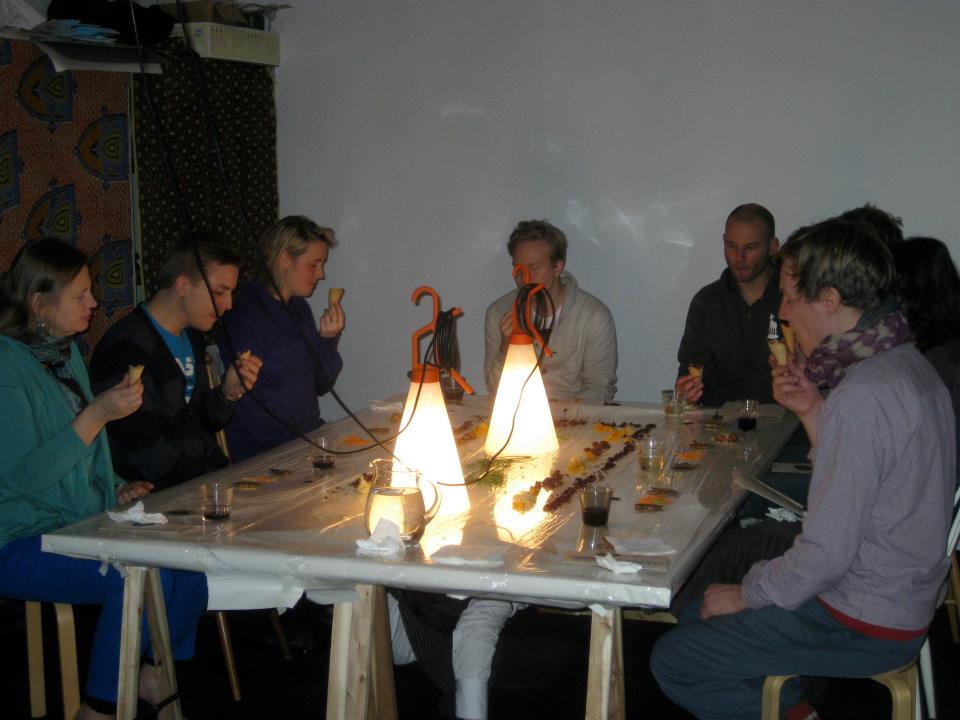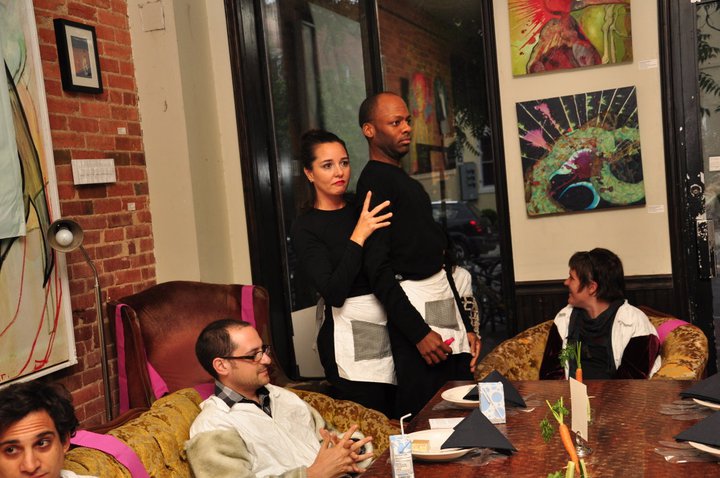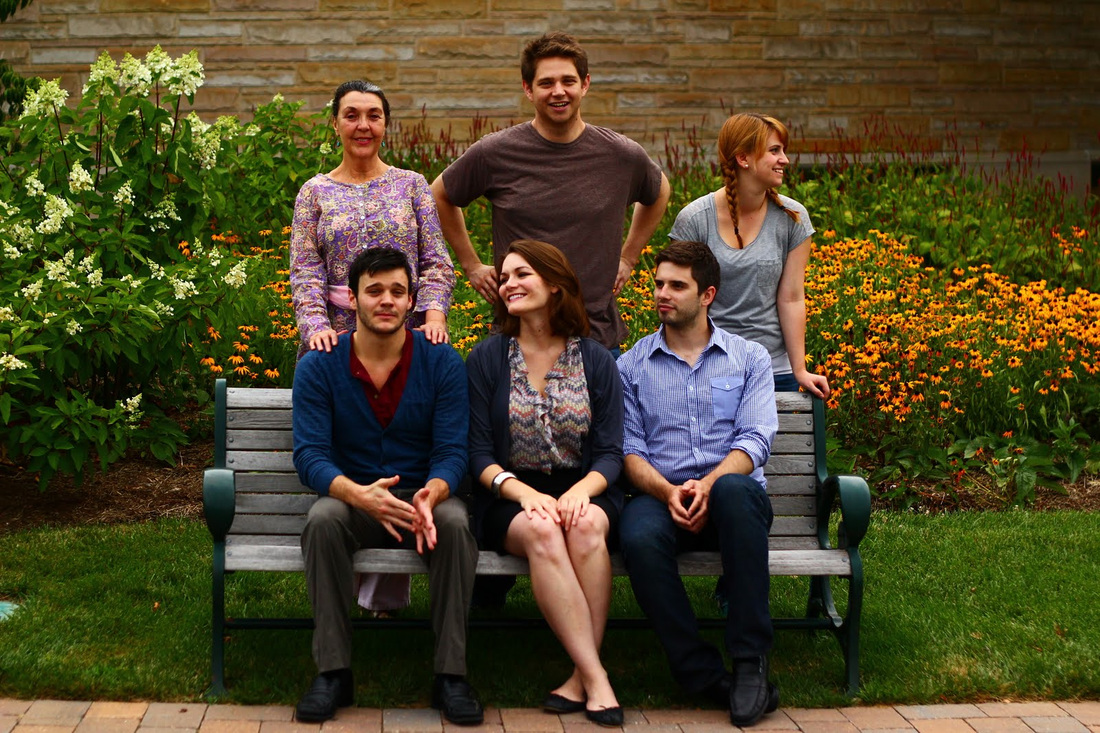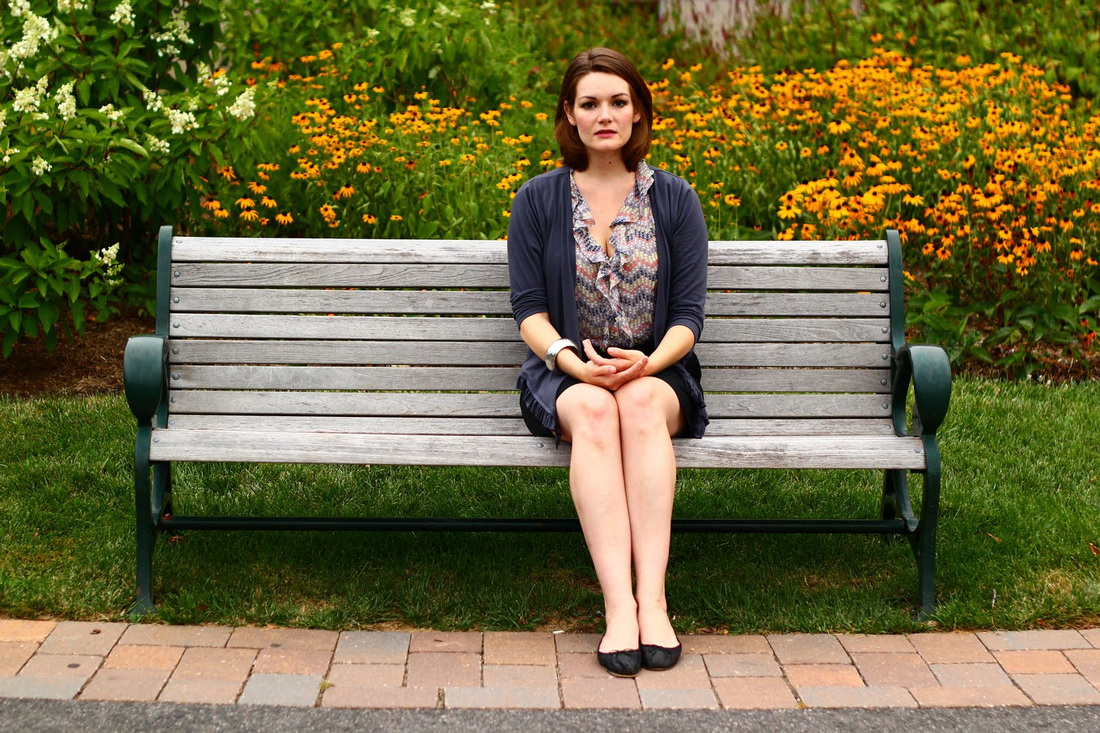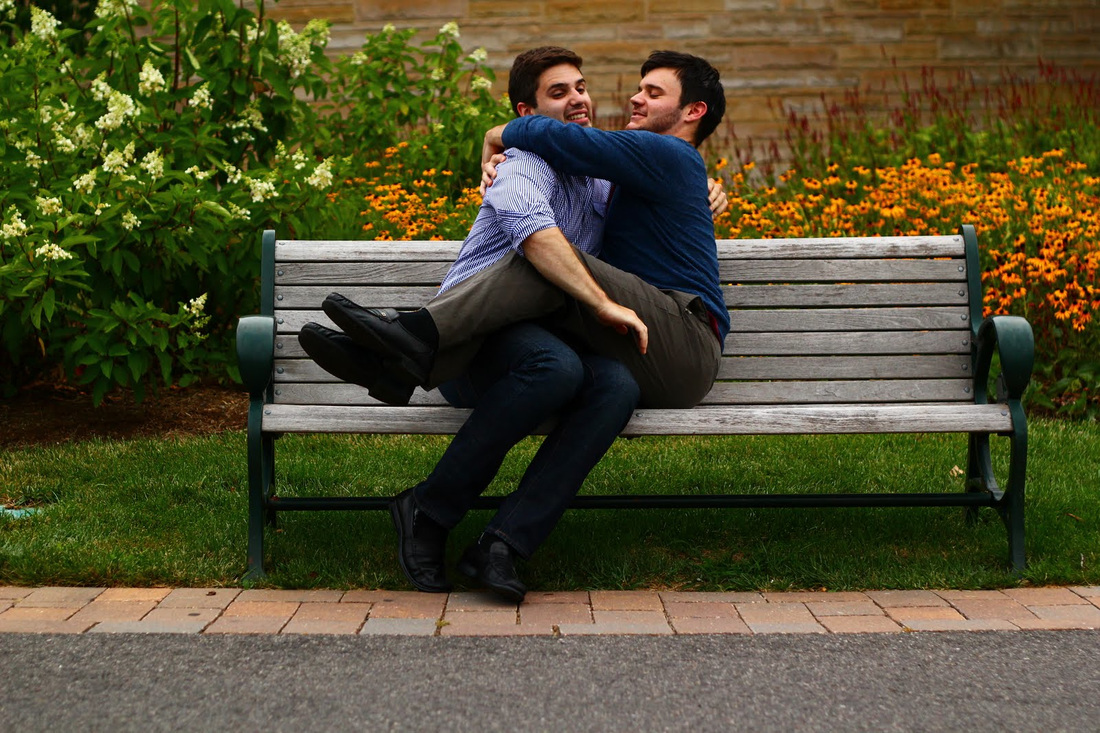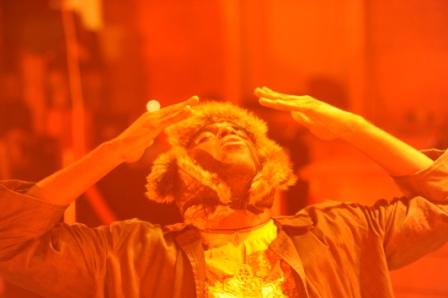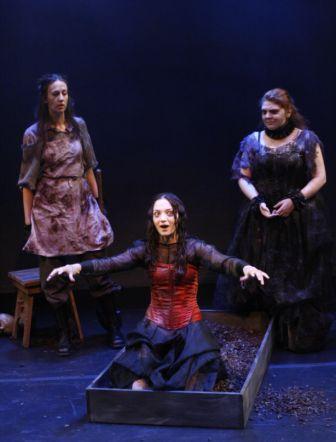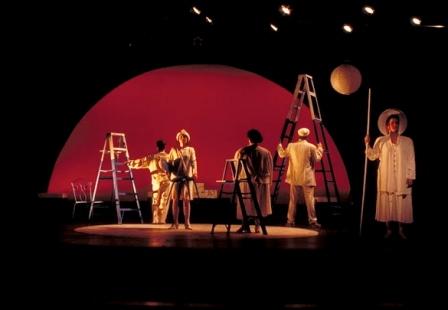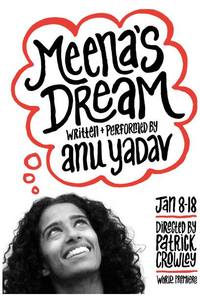 MEENA'S DREAM Written and performed by Anu Yadav Directed by Patrick Crowley Music by Anjna Swaminathan, Rajna Swaminathan, and Sam McCormally January 8-18, 2014 Click here for a full list of performance dates and here for ticketing information About the Play During the day, nine-year-old Meena wishes that her mother could get well; and by night, the Hindu God Lord Krishna appears, entreating Meena's help in his war against the Worry Machine. Meena's Dream creates a fantastical world through storytelling and live music, from South Indian classical to indie folk. 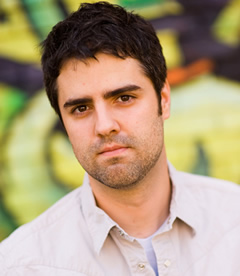 "Meena's Dream is, in a lot of ways, exactly the type of show Forum has been evolving to produce. We've been scratching and searching for the the type of plays and artists that best achieve our mission and these past few seasons have been a real revelation. Forum's highest priority to is to create and present theatre that has real relevance and connections to our audience's lives. In many ways, Meena is just that type of play. It's a beautifully theatrical work that melds the fantastical to a true emotional core. It takes the viewer on a wild trip that feels a millions miles away and lives in your guts at the same time. I've known and admired Anu and her work for many years and it has been an absolute honor and privilege that we get to produce her show. I have the utmost respect and awe with her voice and her talent." Michael Dove, Artistic Director of Forum Theatre 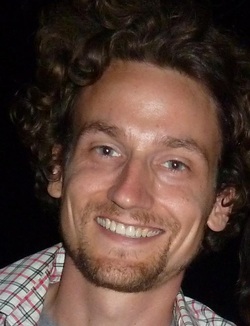 "I think Anu has found a sweet spot with this play in that it has an earnest political message, but it is mitigated by the messenger, a young Indian American girl, Meena. The incredible original music created for the show, the imaginative whimsy, and Anu's knack for funny, revealing and nuanced character portrayals are the spoonful of sugar that makes the medicine go down. Meena argues that there is enough in the world so that we can all have what we need, and that fundamentally our problems flow from a lack of imagination. Meena refuses to be victimized by injustice and dares to dream of something better. While many of our most beloved protagonists today are dark anti-heroes, Meena stands center stage as a young, wholesome heroine we can all root for." Patrick Crowley, Director of Meena's Dream. 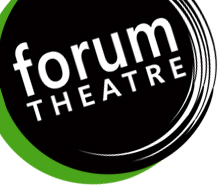 Forum Theatre produces adventurous, relevant, and challenging plays from a diversity of voices that inspire discussion and build community -- and that are accessible, affordable, and entertaining. Since Forum Theatre’s inception, we have aimed to be both the home for stories that provoke discussion and the place to host that discussion. We want our plays to be a conversation with the audience. We tell stories about who we are as a local, national, and global community. So what is a Forum show? That’s never been the easiest thing to describe, but a few things tend to always be true: A Forum show asks big questions. A Forum show is intricate and challenging, but has a big heart at its center. And a Forum show gives you something to think about and a lot to talk about.
0 Comments
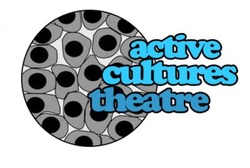 Tomorrow, Friday, December 13th at 7:30pm, please join Hilary Kacser, Laura Zam, and Mary Resing at High Tea Stories--a performance of true stories of honesty, generosity, quality, responsibility and community. "Laura Zam has written a wonderful piece that really captures moments in the lives of women striving to help the world," said Mary Resing, Artistic Director of Active Cultures. "It is very fun and touching. Hilary Kacser and Laura are delightful as they rapid shift from character to character, showing a wide range of the Jewish women of Baltimore." High Tea Stories by Laura Zam directed by Mary Resing performed by Laura Zam and Hilary Kacser Synopsis When Chana, a character from the Book of Samuel, faces conflict and self-doubt, she turns to a group of modern day women in Baltimore for help. A modern parable, High Tea Stories celebrates the role of authenticity, community and generosity in our lives. Friday, Dec 13, 7:30 pm Old Parish House 4711 Knox Road College Park, MD 20740 Click here for directions. Commissioned by The Associated of Baltimore and produced by Active Cultures. Please support our free events with your donation at the door. About the Artists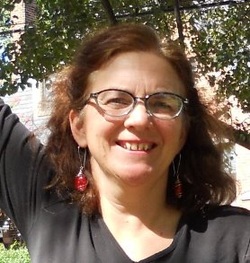 Mary Resing is a playwright, director, dramaturg & producer and the founder of Active Cultures Theatre. In 2012, the Maryland State Arts Council recognized her with an Individual Artist Award in Playwriting for her signed/spoken musical Visible Language. She has served on panels for the TCG, CIES and The Rockefeller Foundation. A proud alumna of Michigan-Ann Arbor, NYU, and Spring Hill College, Dr. Resing was a 2005-2006 US Fulbright Scholar to Armenia. In 2005, she also received an Offstage Award from the League of Washington Theatres for her body of dramaturgical work at Woolly Mammoth. With Tim McKeown, she is co-owner of the successful startup ResingMcKeown Unlimited. 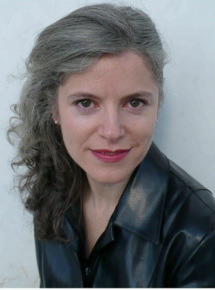 Hilary Kacser is a long time DC actor,who has performed regionally and internationally, on stage and screen. She has produced and performed in every Capital Fringe Festival since the Festival’s inauguration eight years ago. Her original work has been awarded multiple DC Commission on the Arts and Humanties grants. Hilary just returned from Austin,Texas and Miami, Florida, where she performed her touring solo show, “DisordR, the Play,” in which Pakrat Patty the Hoarder comes out of the Clutter Closet (2reprises.blogspot.com). 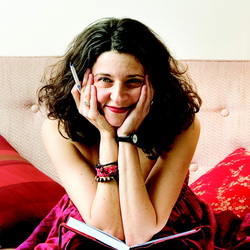 Laura Zam is a writer/performer specializing in solo plays. MARRIED SEX, commissioned by Theater J (Semi-Finalist O’Neill), at NY Fringe and Off-Broadway (United Solo). Other NY performances: Dixon Place, Public Theater, EST and others. COLLATERALLY DAMAGED tours nationally, including Kennedy Center, Woolly Mammoth, Shakespeare Theatre, universities, schools, conferences, and museums. International: four Prague productions. Awards: Tennessee Williams Fellowship, Artist Fellowship (DCCAH), Amiri Barka Literary Prize, and others. Publications: six book anthologies, personal essays and articles. As an arts-educator, Laura has worked with post-trauma populations internationally, including teens from Mid-East, wounded soldiers, and sexual trauma survivors. M.F.A from Brown (Playwriting). LauraZam.com. “Laws and principles are not for the times when there is no temptation: they are for such moments as this, when body and soul rise in mutiny against their rigour ... If at my convenience I might break them, what would be their worth?” |
Marni Penning Coleman: I grew up in Arlington, and used to write little plays to put on in our living room or backyard. My sisters and I, and our friends, would invite the entire neighborhood, and make tickets; it was quite the production. I have always enjoyed writing, but didn't really start writing plays until 2003, and finished my first full-length in 2006. I've worked a lot in DC as an actor, butfrom 1994 to 2000 I lived in Cincinnati, and from 2000 to 2009 I was based in New York. So I've just relocated full-time back to DC in 2009 to marry my wonderful husband.
JL: Have you ever been a member of a DC area playwrights writing group? If so, did you find it useful? Would you recommend that other playwrights join them?
MPC: I haven't; the only playwrights' group I've ever been a part of is the LA Writers Center; I've been a member since 2006. I would love to get involved with a group of playwrights here in DC - perhaps I'd actually finish the two other plays I'm working on right now! :)
JL: In DC, we have the Capital Fringe Festival, the Intersections Festival, the Source Theatre Festival, the Kennedy Center's Page-to-Stage Festival, the Black Theater Festival, and the Hip Hop Theatre Festival. We also have the Mead Lab at Flashpoint Theater Lab Program. Have you participated in any of these? If so, can you speak about your experience?
MPC: I've only been involved with the Fringe Festival as an actor last summer; I thought about producing Carol's Christmas at the Fringe, but Pinky Swear Productions snapped it up before I had a chance to do that, so I was very lucky. I'm hoping to get more involved with those festivals as I produce more work.
JL: What kind of work do you do to pay the bills? How do you balance this work with your writing?
MPC: I started writing when I was on the road as an actor, so my "day job" was acting. I was lucky enough to make my living solely as an actor. When I was in "The Unmentionables" at Woolly Mammoth, I really came to admire Bruce Norris. He and I talked a lot about being an actor who writes plays, and how that helps our playwright's voice. He was huge inspiration to me. Since I've moved back to DC, I do voiceovers, I've taught, I coach, and also have been working as the Sales Trainer at the Container Store in Clarendon. Full-time work has really hampered my writing, though. I kept copious notes in my iPhone for play ideas, but wasn't making the time to write them out. I'm hoping to do more now that I'm home with my one month old son (and have a good dictation program, since my hands are never free to type!)
JL: How many plays have you had produced in the DC area? Were any of these plays self-produced? If so, where and what did you learn from that experience?
MPC: My first full-length play, Carol's Christmas, was produced by Pinky Swear Productions last November and December. I have not self produced down here in DC. I loved working with the women of Pinky Swear. It was a fantastic experience as a playwright, and what I learned was to trust the actors and director and step back from the rehearsal process. I was too close to the words; I knew if I was there at every rehearsal, or even half the rehearsals, they wouldn't be able to find things I didn't realize were there. I had already had two readings of the show and DC and in LA, and I just needed a committed group to take the show and run with it - which they did, and I'm very proud of the results.
JL:If you could be produced at any theatre in DC, which would it be and why?
MPC: I'm a huge fan of Woolly Mammoth. I've done three shows there, and I love the type of quirky, edgy, pushing-the-envelope material that they produce. If I could aspire to write a show that would be accepted anywhere, I would pick Woolly.
JL: DC audiences are ...
MPC: Loyal.
JL: DC actors, designers and directors are ...
MPC: Some of the best I've worked with in the country.
JL: DC critics are ...
MPC: Ah, how do I answer this one? Every artist has a love-hate relationship with critics. But most critics in DC seem to have a genuine love of the theater, and love getting the word out about work that they admire. It's like anywhere else, I guess. You need to have publicity to get the word out about your shows, but if the reviews have a negative bent (and some critics tend to lean that way more than others), everyone wishes the critics wouldn't be quite so "critical." Know what I mean? That said, we do have some very good advocates for the arts in our community. My take is, you can say anything you want, just spell our names right and put them in big letters with a great big photo. :)
JL: How do you feel the DC theatre community has addressed the issues of race and gender parity? How has this particular issue impacted you and your ability to get your work produced on the main stages?
MPC: In DC we have such a diverse community, it feels like we're always celebrating our differences in a good way, whether it be nationality or race or gender. This isn't a town that only churns out plays by dead white males. I haven't been produced on the main stages, so I can't speak to that part of the question. But I don't feel that me being a woman would hinder my chances at all; it always seems that our arts centers are actively seeking out diversity.
JL: What advice do you have for an up and coming DC based playwright or a playwright who has just moved to D.C.?
MPC: Go see plays at every theater you can. Introduce yourself to everyone and let them know you're new in town, or that you're a playwright if they don't know you yet. The arts world is so small, you're bound to have people in common. Get to know each arts organization and their strengths, and get in touch with artists whose work you admire. It's always flattering for actors to hear from playwrights who say they like their work. Build your network this way, then when you've got a piece that's ready, you already have a built-in base of people with whom you can share it. If it's not right for one person, they may know someone else for whom it might be a fit. Be open to anything!
JL: What's next for you as a playwright? Where can we keep up with your work?
MPC: I was on hiatus from the theater while I was pregnant, and I'm slowly getting my feet back under me, but it's still early. I'm two thirds of the way through my next full-length, and I have another full-length play rattling around in my brain that I just need to get down on paper. You can follow what's happening with my work on my website - www.MarniPenning.com. Maybe now that I'm a mom, my writing will take a different bent. We'll have to see!
LM: I’ve worked as a playwright in DC for a little over two years now, but I’ve been back in town for four (I lived here after college, then moved away, then came back again). I’m here because DC is the place I call home: I’m from a small town about an hour away, went to U Maryland, and have a wonderful circle of loved ones here. The healthy amount of opportunities in town don’t hurt either! It’s a nice time to be an artist in DC.
JL: Have you ever been a member of a DC area playwrights writing group? If so, did you find it useful? Would you recommend that other playwrights join them?
LM: Not yet, but I’m planning to start going to meetings at the Playwrights’ Gym. I visited a session as a reader after meeting DW Gregory, one of their founding members, and liked the group's no-nonsense approach. Also, I work closely with my friends a lot, so it’s refreshing for me to spend time with people who aren’t necessarily personal friends or even peers—shakes things up a bit. There’s a nice variety of styles and personalities in the group. Last time they provided really nice snacks, too, so I hope that happens again.
JL: In DC, we have the Capital Fringe Festival, the Intersections Festival, the Source Theatre Festival, the Kennedy Center's Page-to-Stage Festival, the Black Theater Festival, and the Hip Hop Theatre Festival. We also have the Mead Lab at Flashpoint Theater Lab Program. Have you participated in any of these? If so, can you speak about your experience?
LM: Yes, I’ve done Page-to-Stage twice, and participated in an Artistic Blind Date at the Source Festival. I highly recommend them both. Page-to-Stage is a great chance to have your work heard in a safe environment, but I do think you get out of it what you put in. You won't get much in the way of gusto from the Kennedy Center, so it’s best to go with a good, supportive team who will rally around your play along with you. As for the Source Festival ABD, it was quite a different animal than the workshops and productions I’m used to. It was very open-ended and self-directed, and was one of the longest project periods I’ve ever experienced. But it was well worth it. Source was a lot of work, but I came out of it a better and braver artist, and made two new, amazingly talented friends I never would have met otherwise.
JL: What kind of work do you do to pay the bills? How do you balance this work with your writing?
LM: I have a nine-to-five job in public media. Obviously working all day makes writing a part-time gig, which is very hard to handle and stay positive about sometimes. On the other hand, though, I love my job and believe in public broadcasting and in the work that we do. And health insurance is great! Balance is something I’m still trying to figure out—but I’m realizing that perhaps that’s just the way life is and always will be. I write when I can. I also make sure to create deadlines for myself, particularly ones that involve other people, so I HAVE to do it, even when I'm tired.
JL: How many plays have you had produced in the DC area? Were any of these plays self-produced? If so, where and what did you learn from that experience?
lM: One play. The nice folks at Taffety Punk Theatre Company produced my first play, Owl Moon, and I’m still kind of amazed they took a chance on me like that. When I think about that beautiful set, I still have to pinch myself! I’ve had a few readings out there too, both self-produced and not, but have yet to self-produce a show because just thinking about it immediately overwhelms my brain. If I could make it work, I’d gather a team and some funding to do Fringe and Mead Lab.
JL: If you could be produced at any theatre in DC, which would it be and why?
lM: If we’re shooting for the moon here, I’m going with Woolly Mammoth and Contemporary American Theatre Company (ok, sort of near DC) because we’re interested in a lot of the same things. In a theatrical sea of old-ass productions, Woolly is actually producing theater made by living artists (how revolutionary!), and understands how design, style, and new ideas make theater exciting. CATF is where I started out, so it’s always been a dream of mine to return there. They love new plays and take risks on them, and their production process is so pure and out of the ordinary, I can’t really think of a better environment in which to make theater. Dreaming, dreaming is free.
JL: DC audiences are ...
LM: All over the place, as people tend to be. Sometimes they are filled with wonderful passion and smarts and enthusiasm, and sometimes they are rude nincompoops. If we’re going to make sweeping generalizations, I’d say that the scrappier and more broke the production, the more interesting the audiences get. I love audiences who want to be there. People who come to see my stuff, especially the people I don’t know, blow me away with their generosity.
JL: DC actors, designers and directors are …
LM: Pretty darn good! I’ve met and seen the work of so many theatermakers who care so deeply about what they do and about doing it well, they make me want to work 10x harder. This is an industry of lionhearted, passionate workers, and it makes me proud every day to be part of it. I also need to plug the designers and performers of my alma mater, because they are absolutely incredible artists and craftspeople.
JL: DC critics are ...
LM: All over the place, as journalists tend to be. Sometimes they are filled with wonderful passion and smarts and enthusiasm, and sometimes they are rude nincompoops. Ha, I kid. Kinda. There’s a wide spectrum of talent and theater knowledge among our city’s pro to pro-am critics, but I will say that overall, it makes me really happy that they are all so engaged and so plugged into the community. I look at The Washington Post every day for local theater news, and I know I’ll see news and commentary of interest, not just reviews. You won’t find such things in every city!
JL: How do you feel the DC theatre community has addressed the issues of race and gender parity ? How has this particular issue impacted you and your ability to get your work produced on the main stages?
LM: I don’t know. Some theaters, like Forum Theatre and Theater J, have taken real, active steps to make positive change in the world, but that’s all I know about concretely. I’m also not sure what to say about this because it’s a problem everywhere and in everything right now, and I don’t fully understand why it continues. But it does. White privilege and male privilege exist. When I started out, I thought about using a male alias in order to be taken more seriously because plays about women are “issue” plays, you see, as are plays by people of color. I wrote a short blog post about gender issues in 2011, if you want to take a look, but it really just scrapes the tip of a massive, massive, ugly iceberg. At the end of the day, I see myself as just a playwright, plain and simple. I can’t help how I look or what I find interesting, so for now the best I can do is to keep on chugging along and not let people’s personal crap and dumb attitudes bog me down.
JL: What advice do you have for an up and coming DC based playwright or a playwright who has just moved to D.C.?
LM: Oh brother, I have no idea. I could use some advice myself! All I can share is what’s worked for me so far, and that is to find your true friends and kindred spirits in the industry. It’s a long, lonely haul without that. So far, “networking” has amounted to a hill of beans for me. Working with people who are real friends—that’s where it’s at. It’s a mean ol’ world out there. If you're new to DC, get to know the lay of the land because this is a remarkably accessible theater community.
JL: What's next for you as a playwright? Where can we keep up with your work?
LM: Next up for me is work and more work. I’m writing a new script this fall and trying to keep up with my long list of revision tasks and nitpicky theater business stuff. You can follow me on Twitter (@lizmaestri) or visit my jankity but well-meaning website. I’d like to meet new people in town, so please feel free to get in touch!
Carmen Wong: I arrived 8 years ago almost to the day and founded banished? productions shortly after. It was after the summer I graduated: I got an internship in DC for the fall and it certainly helped that my best friend already lived here working as a fellow at ArenaStage. DC has grown with (not on) me. Just as soon as I was ready to flee (about 3 years in), a new wave of energy came through and made my job as play-maker (I shy from the term ‘playwright’ since I feel you lot do such a marvelously different job!) a lot more stimulating.
JL: Have you ever been a member of a DC area playwrights writing group? If so, did you find it useful? Would you recommend that other playwrights join them?
CW: No, I've never been a part of a writing group.
JL: In DC, we have the Capital Fringe Festival, the Intersections Festival, the Source Theatre Festival, the Kennedy Center's Page-to-Stage Festival, the Black Theater Festival, and the Hip Hop Theatre Festival. We also have the Mead Lab at Flashpoint Theater Lab Program. Have you participated in any of these? If so, can you speak about your experience?
CW: I directed a Page-2-Stage reading back in 2005, much of which details I have forgotten. Banished? has participated in the Fringe since its inception in 2006. I’ve written a blog post for HowlRound called, Figuring the Fringe, which gives you an idea of the experience.
I must say that as an artist, I never felt more supported than in my involvement with CulturalDC. Last year they accepted two of my works for their Mead Theatre Lab and Flashpoint Gallery programs (“Into the Dollhouse” and “Tactile Dinner Car” respectively) and that was a vindicating moment to have our work acknowledged as relevant and truly boundary-crossing. Both programs have a great mentorship element and work closely with artists to prep them for public speaking, something quite helpful for me since my nature is to stay behind the limelight. That same year I was asked to direct a 10-minute play by Juanita Rockwell as the Source Festival as well, and we’ve been happily collaborating since!
JL: What kind of work do you do to pay the bills? How do you balance this work with your writing?
CW: I just started part-time work with a mediation and conflict resolution non-profit and I sometimes still work with the farmers’ market, which I’d been working with (as an EBT coordinator, interfacing with food stamp users at market) for the last 3 seasons. These jobs actually keep me sane, grounded, and nourished. They sometimes even provide content for some of the pieces I do, as well as urge me to talk about my work to a wide audience of people not from an arts or theatre background. Also, I’m the sort of person that needs many plates spinning in order to work well and effectively, so this helps with the balance.
JL: How many plays have you had produced in the DC area? Were any of these plays self-produced? If so, where and what did you learn from that experience?
CW: Most all our dozen full works in DC have been self-produced, and many of our small projects are either commissioned or collaboratively created. The exceptions are the pieces with CulturalDC, which were co-produced in the fullest sense, and two or three were collaboratively created and produced with local theatre artists and companies (Happenstance Theatre for one).
In Helsinki (where I’m writing this now and currently working on a piece), I am working with an amazing team of both professionals and semi-professionals that task-forces all the work. So I am able to create in a very singularly-focused manner. The projects created there usually only get a one-day showing (with multiple performances) but are really strong pieces that I learn so much from. My process has been strengthened, and my ideas have expanded in terms of project-conceptualization (which requires honing of instinct and intuition) and producing (in a way that can be very fun/creative, and less obsessive on my part).
JL: If you could be produced at any theatre in DC, which would it be and why?
CW: I find this question intensely difficult as I have more my eye on spaces/sites than the production element of having my piece open to the public. I would say I have my eye on making a piece on the ArenaStage terrace, and another piece in random parts within the common areas of Woolly Mammoth.
JL: DC audiences are ...
CW: The best challenge and resource I have.
JL: DC actors, designers and directors are ...
CW: I have worked so much outside the zone (working with non-actors, dancers, and designers/artists) that I only have recently got to know the insider DC theatre scene a little better and as in any place, a little clique-ish but just lovely.
JL: DC critics are ...
CW: Getting to know us and we, them
JL: How do you feel the DC theatre community has addressed the issues of race and gender parity ? How has this particular issue impacted you and your ability to get your work produced on the main stages?
CW: This is a pretty loaded potato. Perhaps because banished? has just forged its own path, I can be quite blind to some of these issues and how/whether it has impacted me. I think there could be more inter-everything collaboration and I’m definitely interested in trying to work it out in some of the decisions I make for the company.
JL: What advice do you have for an up and coming DC based playwright or a playwright who has just moved to D.C.?
CW: Keep working, keep your eyes open to possibilities and never be afraid to take risks. Go to lots of things, free museums, weird events, see it all.
JL: What's next for you as a playwright? Where can we keep up with your work?
CW: I am currently producing a modest piece in Helsinki called “Dinner for the Forgotten”, it is about eating to remember the people we have left behind or to leave the past be. That will open this Saturday, working with the same amazing team that co-created last year’s “Tactile Taste of Helsinki”.
Then its back to DC and hitting the ground running with the Dupont Circle version of “The Circle” by Juanita Rockwell, which launches Wed, Sept 26 (with a Happy Hour event at Dolcezza gelato from 5:30pm to 8:30pm, please join us!) and has shows on: Sat 9/29, Sat 10/6 and Sun 10/7 at 6:00pm and 7:00pm each day.
Next up we have a piece with CulturalDC on installation at (e)merge art fair at the Skyline Hotel. The piece will be on view:
Thu 10/4 @7:00pm – 9:00pm
Fri 10/5 @12:00pm – 7:00pm
Sat 10/6 @12:00pm – 7:00pm
Sun 10/7 @12:00pm – 5:00pm
Then we will stage Into the Dollhouse at a secret location in November before Thanksgiving, so look out for that!
We also have a lot of little events and social gatherings where we celebrate the people who volunteer or work with us, and we’re planning a fundraising Holiday party with a twist (when do we not twist?). All are welcome! Get details from our FB page!
DM: I've lived and worked as a playwright in DC for just over a year. I moved here to become the Company Manager/Production Management Apprentice at The Studio Theatre. I had just graduated from Emerson College and was in a post-grad school "What now?" I was hired by Studio just after July 4th and moved to DC two weeks later. I had my DC playwriting debut in the 10th Annual Page-to-Stage Festival as part of the Playwrights' Slam. And after my apprenticeship ended, I decided to stay despite the fact that I was (at the time) what one would call "underemployed." I owe the DC-Area Playwrights a lot of the reason for staying. The other reason was so that I could continue to build up my own theatre company -- Field Trip Theatre.
JL: Have you ever been a member of a DC area playwrights writing group? If so, did you find it useful? Would you recommend that other playwrights join them?
DM: I'm one of the co-moderators of the group now, so of course I would recommend that everyone join. Gwydion Suilebhan is reason enough to lurk on the boards. He's always asking the tough questions about the state of DC playwrights.
JL: In DC, we have the Capital Fringe Festival, the Intersections Festival, the Source Festival, the Kennedy Center's Page-to-Stage Festival, the Black Theater Festival, and the Hip Hop Theatre Festival. We also have the Mead Lab at Flashpoint Theater Lab Program. Have you participated in any of these? If so, can you speak about your experience?
DM: I've participated in the Kennedy Center's Page-to-Stage Festival -- I'm going on my second year now, actually -- and the Capital Fringe Festival. Any reason to hear your work aloud -- whether that be in staged reading at Page-to-Stage or fully produced at the Capital Fringe Festival -- is time well spent. I feel weird saying it because I'm a relatively young playwright, but it will help you grow as a writer and as an artist. You'll throw yourself in writing seclusion and you'll write more than you ever have in your life and your friends will never see you, but you have to seize those opportunities. They come along for us playwrights so seldom.
JL: What kind of work do you do to pay the bills? How do you balance this work with your writing?
DM: Until a few months ago I was an apprentice and Company Manager. I learned a lot in that year, but it really hurt my writing. I was always on call and my hours were all over the place. I recently got a job working in HR at one of The District's regional theatres and that schedule suites me much better. I'm still working in theatre, but I have a 9-to-5 schedule. When I get off work, I'm able to turn off my phone and just write. It's bliss.
JL: How many plays have you had produced in the DC area? Were any of these plays self-produced? If so, where and what did you learn from that experience?
DM: As of this weekend, seven. Six of those productions were staged readings and one was the full production of Stopgap at the Capital Fringe Festival. I work a lot with my own theatre company (Field Trip Theatre), but I've also worked with Artists' Bloc and Georgetown Theatre Company.
JL: If you could be produced at any theatre in DC, which would it be and why?
DM: Woolly Mammoth. No question.
JL: DC audiences are ...
DM: Incredible. So many strangers have come to see my plays and every time I look around and say, "You know we don't know each other, right? You don't have to be here."
JL: DC actors, designers and directors are ...
DM: So smart. Or maybe I've just been lucky.
JL: DC critics are ...
DM: Well, I kind of love Peter Marks. Anyone who compares me to Wendy Wasserstein is okay in my book. Check out his review of my play, Stopgap!
JL: How do you feel the DC theatre community has addressed the issues of race and gender parity ? How has this particular issue impacted you and your ability to get your work produced on the main stages?
DM: I don't think that theatres look at the title page and say "This is written by a woman. That's ridiculous!" But when you step back and look at the season at a whole, you'll notice that there's a pathetic number of women represented. And this isn't just in playwrights, but in directors and actors as well. But this isn't just a DC problem. This is a pattern across the entire country.
JL: What advice do you have for an up and coming DC based playwright or a playwright who has just moved to D.C.?
DM: Submit everywhere. Talk to everyone. Write everywhere. And see as much theatre as you can. Even the bad stuff.
JL: What's next for you as a playwright? Where can we keep up with your work?
DM: I have two plays in the Kennedy Center's Page-to-Stage Festival this weekend. (Artists' Bloc presents The Crow on Saturday, September 1 at 7:30PM and Field Trip Theatre presents Jim and Paul Meet in Dreams on Monday, September 3 at 3:30PM.) After that, I have a couple of projects lined up. But I won't talk about them until I have a draft out that I'm happy with. (All this and mysterious too.) I tweet all the time (@daniellemohlman) and you can check out Field Trip Theatre at fieldtriptheatre.tumblr.com
JR: I grew up just outside the DC line, left town at 17, and then lived in a variety of interesting places for 20 years. For six years, I was Artistic Director of Company One Theater, a professional theater in Hartford, CT, that produced premieres by folks like Suzan-Lori Parks, Paula Vogel, Deborah Brevoort, Oana-Maria Hock, Rachel Sheinkin, Erik Ehn, John C. Russell, Elizabeth Egloff, Bridget Carpenter, Lisa Jones, and Donna diNovelli. When Company One went under (a sad story for another day), I ended up accepting an offer to develop and direct a brand new MFA in experimental theater at Towson University. I was planning to spend three years getting it up and running and then get back to my work. Eighteen years later, I’m still teaching at Towson, although I have since stepped down as director and dropped to half-time, in order to leave more time for my writing and directing.
JL: Have you ever been a member of a DC area playwrights writing group? If so, did you find it useful? Would you recommend that other playwrights join them?
JR: I’ve heard some great things about a number of writing groups in DC, and I think it’s fantastic that there are now so many! I’ve never belonged to a local writing group, per se. In addition to my teaching at Towson, I teach in a low residency MA/MFA creative writing program at Wilkes University, PA. Thirty-five writers show up twice a year to do readings at the residencies and talk about our work with each other, and some of us have gone away on writing retreats together, email work to each other, etc. And I have writer friends around the country, including dramaturg Mame Hunt, who have been very helpful in responding to my work - I hope I’ve been as helpful in responding to theirs! And of course my husband Chas Marsh, who is also my favorite composer, sound designer and video artist, is usually the first ear.
I do recommend finding the right people with whom you can share your work, and I know that many people find a writing group invaluable. I think the best structure for that sharing may look different for each of us, and we often need different kinds of input at different times in our process. Especially in the early stages of writing, I think it’s important to have responders who share (or at least appreciate) your aesthetic, so your work doesn’t get derailed before you even know what it wants to be.
JL: In DC, we have the Capital Fringe Festival, the Intersections Festival, the Source Festival, the Kennedy Center's Page-to-Stage Festival, the Black Theater Festival, and the Hip Hop Theatre Festival. We also have the Mead Lab at Flashpoint Theater Lab Program. Have you participated in any of these? If so, can you speak about your experience?
JR: I’ve had my writing produced in the Source Festival three times, and just had a piece in the Cap Fringe this summer. Each time it was a very different kind of experience, but all basically good ones. Festivals have a certain frantic yet exhilarating energy, and they give artists a chance to try out different collaborations, which has certainly been useful and rewarding for me. I’ve met wonderful artists and incredibly hardworking and dedicated people in all aspects of the production process.
JL: What kind of work do you do to pay the bills? How do you balance this work with your writing?
JR: I was founding director of Towson University’s MFA in Theatre Program in 1994 and directed it for a dozen years. I continue to teach playwriting and new works development there and also teach in Wilkes University’s Creative Writing MA/MFA since consulting on its development in 2004.
Teaching is my main money gig. I find it inspiring and satisfying, and I especially love the individual mentoring of the graduate school teaching experience, but universities seem to be learning all the wrong lessons from the business world. Let’s just say I find a contemplative practice essential to maintaining any semblance of a balance in university life.
I may sometimes complain about teaching taking away from my writing time, but I don’t think that trying to rely on income from art-making would work for me in our culture, especially when you consider the commitment to self-promotion it takes these days. I don’t see that the free market supports creativity in any real way because it encourages the repetition of commercial success over the risk of experimentation: I’m amazed by the extraordinary artists who manage to continue to do brilliant work under those conditions. I feel for my students, and am horrified by the absurd rising costs of higher education that are making it harder and harder to let an artist’s education be about inquiry and experimentation. I worry about this a lot, how commodification undermines art in our society, and so I deeply appreciate having a job that allows me to create my work without focusing on how much income each individual project is going to provide.
JL: How many plays have you had produced in the DC area? Were any of these plays self-produced? If so, where and what did you learn from that experience?
JR: I’ve done much more of my work outside of DC than in it, both as a writer and as a director. Once I came back to the DC area, I was still trading more on my connections in other cities and didn’t really have time to build my DC connections back up when I was running the MFA at Towson.
The down and dirty speed of putting work up in the Source and Cap Fringe Festivals was great in terms of helping me see what I need to rewrite – and several of those plays then got produced in their new forms, in other cities. I’m grateful to Maryland Ensemble Theatre in Frederick, who have offered to work on a new script I’m writing. If we’re counting Baltimore in the equation, I’ve had plays produced by Single Carrot, Iron Crow, The Acme Corporation, and The UnSaddest Factory. And I’ve directed productions at Everyman, Baltimore Theatre Project, Towson U and UMBC in Baltimore, and at Theatre of the First Amendment, Active Cultures (directing your lovely MAD BREED, Jackie!), Atlas, Source, and DCAC.
Since the first 20 years of my career were primarily as a director, I’ve done a lot of producing. Company One was an Equity company, so we basically followed the regional theatre model, although we did some odd things like a live-broadcast radio series, a lunchtime theatre series, a museum tea-time reading series, and an opera. I try not to be the lead producer on projects any more, but I think that playwrights generally have a responsibility now to think of themselves as part of the producing team. Every theatre can use all the help we can give them to get the word out and audiences in the door.
JL: If you could be produced at any theatre in DC, which would it be and why?
JR: Other than the theatres I’ve known for decades, I try to visit a variety of theatres in DC, and I know better than to draw conclusions from having seen only a couple of plays at any given theatre. I must admit I don’t get down to DC nearly often enough to check out a full range over time of what’s being offered in so many of DC’s smaller theatres that often feature shorter runs.
It’s still not easy to find theatres interested in work that deeply challenges conventional narrative structure. These days, the term “experimental” often refers to the physical performance style, the use of media, a devised development process, or challenging content. Those are all good, and I do all those things in my work, too. However, my personal favorite playground for shaking up our point of view is formal experimentation in language and structure, and that is still what scares theatres the most.
These days, I’m especially interested in the DIY arts movement, both for its disregard of distinctions between disciplines and genres, and for its anti-consumerism. Baltimore has a lot going on in that scene, perhaps in part because there are a lot of young artists, filmmakers and musicians who stay in town after graduating from MICA, Towson, Hopkins or UMBC. They then start companies here with artists in the area or nearby cities, and tour work to NYC, Philly, DC or elsewhere: Wham City, Woof Nova, Missoula Oblongata, Kuumba Collective, EMP Collective, UnSaddest Factory, Single Carrot, Iron Crow, Nommo Theatre, Acme Corporation, Annex, Glass Mind, Copycat, In-Flight, DNA, White Flag; the Trans-Modern, Wordbridge and High Zero Festivals – now I’ll start getting in trouble for leaving out a lot of other good ones! Maybe we need an exchange program for playwrights, between the beltways: I encourage DC playwrights to look into the Baltimore scene, and I promise to head down 95 more often.
JL: DC audiences are…
JR: They seem to be getting more adventurous, I’m happy to say. And I love to see the different communities that get drawn to different theatres.
JL: DC actors, designers and directors are…
JR: It’s amazing to see how this community of artists has grown in both quantity and quality since I first directed in DC, more than 20 years ago. I think DC is as good a community of theatre artists as any city in the country.
JL: DC critics…
JR: The state of American theatre criticism, everywhere, is a big concern. I am still astonished to read so many reviews that talk about “the spine of the play,” “whose story is this?,” “what’s the central conflict?” and other semi-Aristotelian notions when a play is obviously exploring other approaches to narrative. Contemporary psychological theory is so much more interesting than the “character arcs” and pseudo-Freudian approaches of the 1950’s we still see some critics craving. It’s the critic’s job to help audiences see deeper into a play, not flatten it out. Sorry. Hot topic. DC is no worse than most places. Let’s move on, shall we?
JL: How do you feel the DC theatre community has addressed the issues of race and gender parity ? How has this particular issue impacted you and your ability to get your work produced on the main stages?
JR: Congrats on doing your part by writing this blog, Jackie! It seems that concerted activist efforts may have started to move things a bit in some quarters, although tokenism is still rampant. At my theatre in Hartford, when I was reading dozens of new plays every week, I found that many plays challenging conventional narrative, character, and structure, were often written by women, LGBT artists, and people outside the western European tradition. I think this formal expression of otherness still stops some of our most exciting writers from getting produced outside New York City.
JL: What advice do you have for an up and coming DC based playwright or a playwright who has just moved to D.C.?
JR: Take advantage of DC’s incredible wealth of resources, from festivals to writing groups to small theatres. But don’t get stuck in your own city limits: check out Baltimore and Philly and NYC - and Montreal and Moscow, for that matter. I notice that many cities (including my adopted home here in B’more) can get a little claustrophobic, artistically. We need to keep the communication open between the cities as well as in our own communities. And maybe most important: take care of yourself. Find time to get a little nature on you, meditate, step away from the keyboard. Don’t focus on your career in art, focus on your life in art.
JL: What's next for you as a playwright? Where can we keep up with your work?
JR: My script for THE CIRCLE, Banished? Production’s site-specific audio play that Carmen Wong just directed for the Cap Fringe, is being remounted at Dupont Circle 9/26 to 10/7: www.banishedproductions.org
I’m directing Jordan Harrison’s ACT A LADY at Iron Crow, Baltimore Theatre Project, May 2013, which should be a blast: www.ironcrowtheatre.com
I’m working with Cincinnati composer Douglas Knehans, writing a libretto for BACKWARDS FROM WINTER: an opera for soprano, electric cello and video that we should be getting into the recording studio by early 2013.
I'm writing the libretto and directing an opera for soprano and electric cello with composer Douglas Knehans (2013).
And in the category of how to keep sane and creative, I taught a workshop on meditation and playwriting this summer at the KO Festival of Performance, and look forward to continuing this exploration of the connection between contemplative practice and artistic process: http://kofest.com/playwriting_workshop/
I announce projects through my facebook page, so friend me for updates, and my website is www.juanitarockwell.com
My Blog
Categories
All
Advocates For Youth
ARDEO
Blackbirds
Dance Exchange
Dc Theatre
Diversity And Inclusion
Dramatist Guild
Gender Parity
Intelligence
Lions Of Industry
LoTT
Love Brothers Serenade
Mothers Of Invention
Musings
Nnpn
Noms De Guerre
Nso
Our Man Beverly Snow
Plays For Two
TCG
Theatre Education
Theatre For Social Change
The Hampton Years
The Inferior Sex
Triangle Theatre
Wizard Of Oz
Women Artistic Directors
Women Directors
Women Dramaturgs
Women Playwrights
Women Stage Managers
Women Theatre Critics
Xx Playlab Festival
Archives
June 2020
April 2020
December 2019
September 2019
May 2019
March 2019
February 2019
January 2019
December 2018
November 2018
September 2018
April 2018
March 2018
February 2018
June 2017
April 2017
March 2017
February 2017
August 2016
May 2016
April 2016
March 2016
February 2016
January 2016
December 2015
November 2015
July 2015
June 2015
May 2015
April 2015
March 2015
February 2015
January 2015
December 2014
October 2014
September 2014
July 2014
June 2014
May 2014
April 2014
March 2014
February 2014
January 2014
December 2013
November 2013
October 2013
September 2013
August 2013
July 2013
June 2013
May 2013
April 2013
March 2013
February 2013
January 2013
December 2012
November 2012
October 2012
September 2012
August 2012
July 2012
May 2012


